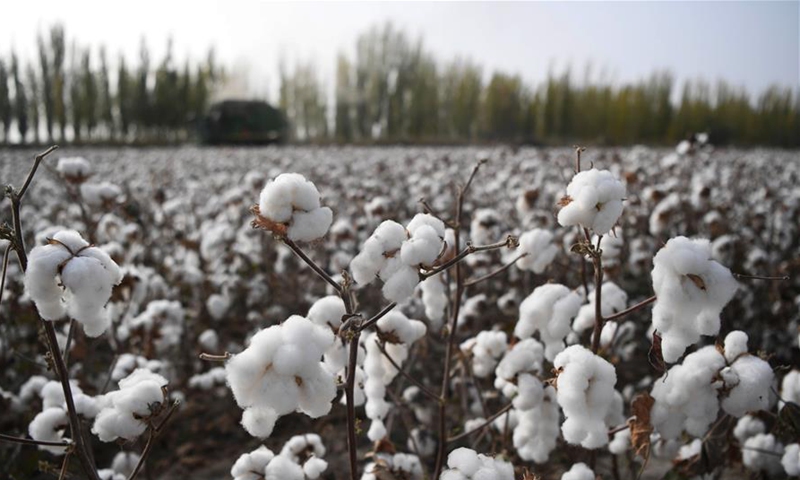Xinjiang cotton ban a vivid display of Western companies’ pursuit of self gain amid China-West escalating tensions: industry insiders

Photo taken on Oct.25, 2019 shows a cotton field in Awat County, northwest China's Xinjiang Uygur Autonomous Region. With a long history of cotton planting, Awat is known as the "Town of Cotton" in China. The county boasts high-quality cotton and high-efficiency in production. (Xinhua/Sadat)
While the Xinjiang cotton ban issued by the Better Cotton Initiative (BCI) underscores some member companies' pursuit of self gain amid tense relations between Beijing and the West, it is an exaggeration to interpret such a move as a West-led strategic crackdown similar to that on Huawei and semiconductor, with aims to smash China's rising high-tech sector, industry insiders and observers said.
However, the ban's effect does expose persisting issues in China's local cotton industry, such as a lack of participation in global standard-making and the absence of a high-end downstream textile and clothing industry, in which observers urge the world's second-largest cotton producer to speed up climbing the ladder.
Some foreign brands, including H&M and Nike, have maliciously refused to source cotton from Northwest China's Xinjiang Uygur Autonomous Region, citing the BCI license suspension and a hyped-up "forced labor" illusion. BCI, a claimed non-governmental organization that aims to promote better standards in cotton farming, has suspended licenses to companies in Xinjiang.
The event has been in the limelight for several days, sparking widespread anger and boycott calls among Chinese consumers. Some conspiracy theories also surfaced, describing the ban as another "black swan" event after Huawei that mirrors the white-hot industrial competition between China and the US.
"The West is making use of Xinjiang cotton to clamp down on China's textile and clothing industry, and crumpling China's industrial chain," an Internet celebrity named Industry Observer said in a post on social networking platform Weibo on Friday. Another cotton industry self-media source also noted the ban aims to isolate China from global trade.
Zhang Jie, a manager of a local textile manufacturer in Xinjiang, told the Global Times on Friday that although the stakes involving the BCI suspension are high, as it matters to the livelihoods of thousands of farmers in Xinjiang, it is wrong to conclude that such a ban on a labor-intensive industry is critical to China's key national interests.
"In fact, it involves more of the interests of BCI members, who may be eager to reap profits from escalating tensions between China and the West," Zhang said. He added that some foreign textile companies may take the BCI ban to further falsify Xinjiang stories so as to control the global supply chain and consolidate their dominant positions.
According to Zhang, his textile company signed export orders with Shanghai-based foreign trade agencies in January. But the orders have now been put on hold due to the ban, as their major foreign clients are BCI members.
At the end of 2019, BCI had more than 1,840 members. The BCI Retailer and Brand Members include brands such as H&M, Adidas, Nike and Muji.
"It is a coordinated corporate plot motivated by commercial interests using the claimed force labor issue as a disguise," Li Guoxiang, a research fellow at the Chinese Academy of Social Sciences, told the Global Times on Friday.
China is the world's second largest cotton producer, following India, with Xinjiang's output accounting for over 85 percent of domestic production. China is also the world's largest textile production and exporting country in the world.
Industry observers said that China's textile industry has an edge in global upstream supply and manufacturing, yet it lacks influence in global standard-setting.
"It is noteworthy that BCI - manipulated by foreign companies - could unilaterally impose bans on Xinjiang's cotton exports. Chinese firms need to participate more in such global organizations to prevent them from abusing power and making our voices be heard," Li said.
Zhang also called for a reshuffle in China's textile export industry. "Most Chinese manufactures adopt the OEM model as foreign brands dominated the global high-end shoes and clothes industry. China also needs to cultivate homegrown globally influential brands," Zhang said.
